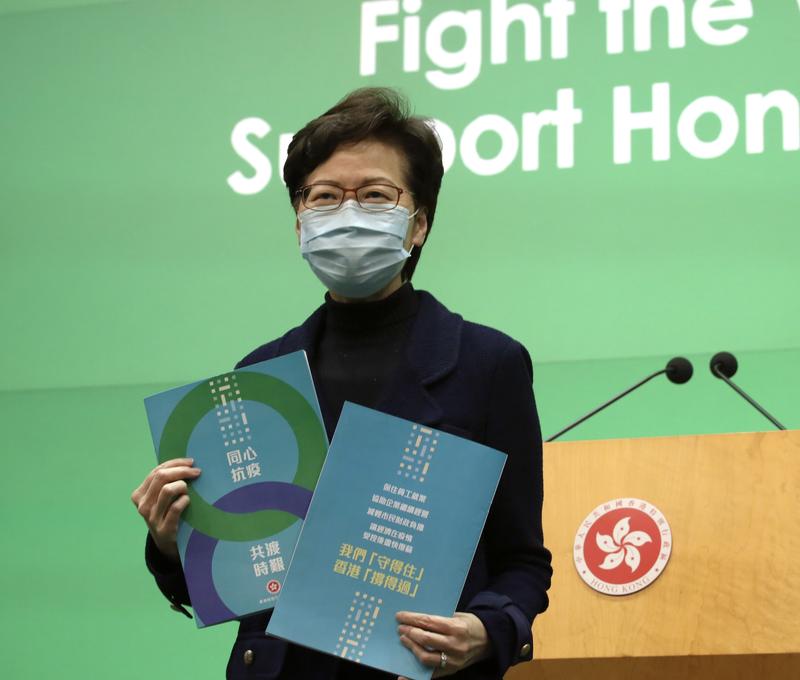 Hong Kong Chief Executive Carrie Lam Cheng Yuet-ngor briefs the media about the government’s Anti-Epidemic Fund on Tuesday. (PARKER ZHENG / CHINA DAILY)
Hong Kong Chief Executive Carrie Lam Cheng Yuet-ngor briefs the media about the government’s Anti-Epidemic Fund on Tuesday. (PARKER ZHENG / CHINA DAILY)
Carrie Lam Cheng Yuet-ngor, chief executive of the Hong Kong Special Administrative Region, said on Tuesday it was well within the central government’s powers to comment on the current deadlock in the city’s legislature, which has been paralyzed for six months.
Such powers are guaranteed under the “one country, two systems” principle, explained Lam.
The city’s leader rejected accusations that two central government bodies overseeing Hong Kong affairs were interfering with the affairs of the SAR, when they criticized on Monday some opposition lawmakers’ delaying tactics in the Legislative Council.
It is only right for the Hong Kong and Macao Affairs Office of the State Council and the Liaison Office of the Central People’s Government in the Hong Kong SAR to speak about the deadlock in LegCo to ensure “one country, two systems” is accurately implemented, Carrie Lam said
The comments by the Hong Kong and Macao Affairs Office of the State Council and the Liaison Office of the Central People’s Government in the Hong Kong SAR were made out of legitimate concern for the city, Lam added.
ALSO READ: Opposition condemned for HK LegCo quagmire
The central government has given Hong Kong a high degree of autonomy through the Basic Law under “one country, two systems”. But that does not mean the central government has relinquished its powers and authority over Hong Kong affairs, she said.
It is only right for the two central government institutions to speak about the deadlock in LegCo to ensure “one country, two systems” is accurately implemented, Lam added.
What is outright meddling, she stressed, is what some lawmakers sought to achieve by lobbying foreign governments and politicians to interfere in the SAR’s affairs and to impose sanctions on Hong Kong.
As a result of opposition lawmakers’ delaying tactics, the legislature has yet to elect a chairperson of its House Committee for this legislative year. This has rendered it powerless to deliberate on dozens of bills and subsidiary laws, including those addressing pressing livelihood issues.
Opposition Legislator Dennis Kwok Wing-hang has presided over 14 meetings that failed to elect the committee’s chairperson.
It is unacceptable that many of LegCo’s functions, including making legislation and debating the chief executive’s policy address, have not been performed since October. This has directly affected the city’s economic development and people’s livelihoods, Lam noted.
Irrefutable evidence has shown that disruptive acts by Kwok and his colleagues from the opposition camp were having serious social consequences, Lam said.
She said at least 26 bills had been affected, including bills to increase maternity leave from 10 weeks to 14 weeks, to cut taxes, and to ratify the appointment of the incoming chief justice.
If these bills fail to pass before July when this LegCo term ends, they will need to start all over, Lam said. This will be very disappointing to everyone who worked on these bills, she added.
Lam’s remarks were echoed by Hong Kong political leaders.
READ MORE: LegCo head: Performance of House Committee unsatisfactory
Leung Chun-ying, vice-chairman of the National Committee of the Chinese People’s Political Consultative Conference, the country’s top political advisory body, said central government authorities have every right to condemn lawmakers who refuse to discharge their constitutional duties under the Basic Law.
Tam Yiu-chung, a member of the National People’s Congress Standing Committee, the nation’s top legislature, said the criticism by the central government bodies was based on facts. Obstructing the proper functioning of LegCo for half a year was an obvious dereliction of duty, Tam said.
At a press briefing inside the LegCo Complex with several other lawmakers on Tuesday, Legislator Regina Ip Lau Suk-yee said a legislature that fails to function is detrimental to the well-being of all Hong Kong residents. For that reason, the central government has an obligation to speak out, she added.
Legislator Gary Chan Hak-kan stressed that the HKMAO and the Liaison Office made the comments to ensure proper implementation of “one country, two systems” for the long-term stability of Hong Kong.


